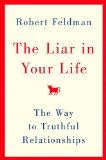new book – ‘The Liar in Your Life’ by Robert Feldman
August 5, 2009
While waiting for new episodes of Lie to Me (returning 9/28/09), fans of that show might be interested in The Liar in Your Life: The Way to Truthful Relationships by Robert Feldman (Twelve, Aug 3, 2009). [“Look Inside the Book” available at Amazon.]
Product description from the publisher:
Product Description
In The Liar in Your Life, psychology professor Robert Feldman, one of the world’s leading authorities on deception, draws on his immense body of knowledge to give fresh insights into how and why we lie, how our culture has become increasingly tolerant of deception, the cost it exacts on us, and what to do about it. His work is at once surprising and sobering, full of corrections for common myths and explanations of pervasive oversimplifications.Feldman examines marital infidelity, little white lies, career-driven resumé lies, and how we teach children to lie. Along the way, he reveals-despite our beliefs to the contrary- how it is nearly impossible to spot a liar (studies have shown no relationship between nervousness, lack of eye contact, or a trembling voice, and acts of deception). He also provides startling evidence of just how integral lying is to our culture; indeed, his research shows that two people, meeting for the first time, will lie to each other an average of three times in the first ten minutes of a conversation.
Feldman uses this discussion of deception to explore ways we can cope with infidelity, betrayal, and mistrust, in our friends and family. He also describes the lies we tell ourselves: Sometimes, the liar in your life is the person you see in the mirror. With incisive clarity and wry wit, Feldman has written a truthful book for anyone who whose life has been touched by deception.
For more information:
An excerpt is available at ABC News.
Author interview at NPR
Author’s website
Related reading: The Philosophy of Deception ed. by Clancy Martin (Oxford University Press, July 10, 2009).
Product description from the publisher:
Product Description
This volume gathers together new essays on deception and self-deception by leading thinkers on the subject. The contributors discuss topics including the nature and the definition of deception; whether deception is morally blameworthy or not; attacks against and defenses of self-deception; and the most famous philosophical account of lying by Immanuel Kant. Deception of others and self-deception share many more interconnections than is normally recognized, and these essays reveal the benefits of considering them together.
The Philosophy of Deception will be of interest to philosophers across the spectrum including those interested in philosophy of mind, philosophy of psychology, and metaphysics.




